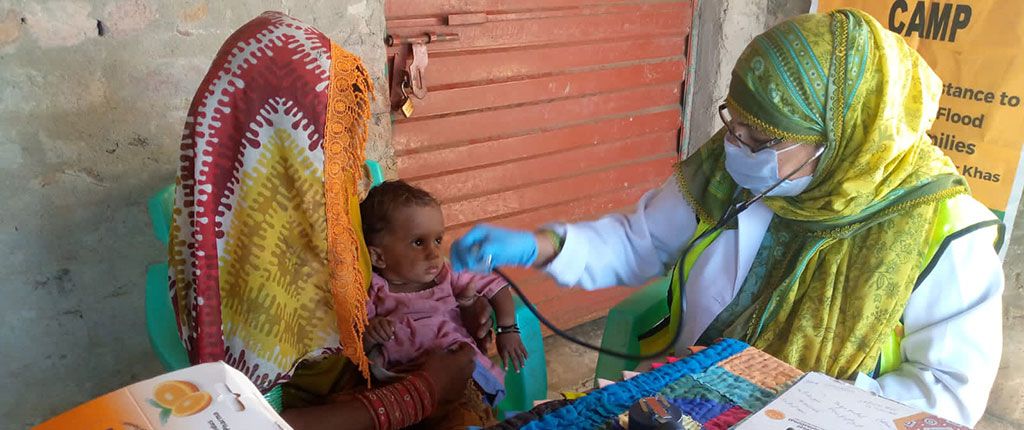
Improving health and nutrition for Afghan refugees and host communities in Pakistan
As a neighboring country, Pakistan has always been directly affected by events in Afghanistan. The Islamic Republic of Pakistan has been hosting Afghan refugees for decades. More than 3 million Afghans are currently taking refuge in Pakistan. This number has been increasingly rapidly since the Taliban took over in 2021. Caring for the refugees is stretching the Pakistani government and the host communities to their limits: Access to quality and equitable healthcare is a major problem for both refugees and host communities. In terms of providing care, however, the Pakistani government has been neglective to care for these people and their host communities. Access to quality, equitable health care is a major problem for both refugees and host communities. There is an urgent need for medical care, especially for maternal, newborn and child health.
Since October 2022 we support the nutrition of children and pregnant women by providing basic health services for refugees and host communities in the districts of Peshawar, Charsadda and Nowshera in Khyber Pakhtunkhwa Province. By operating three primary health centers in the region and providing medical services for mothers and children, as well as hygiene trainings, we are improving the health and wellbeing of people in crisis-affected areas.
For more than 40 years, Pakistan has been among the most welcoming countries for refugees worldwide. An estimated 3 million registered and unregistered Afghani refugees currently reside there. Considering these high numbers - which increased rapidly during after the takeover by the Taliban in 2021 - the lingering effects of the COVID-19 pandemic, economic instabilities and inflation pushed the Pakistani government to its limits. As such, adequate care for the vulnerable population of Pakistan can oftentimes not be ensured.
The humanitarian needs of both refugees and host communities are high - especially in the health sector. Due to deficiencies in the public health system, access to adequate and equitable access to medical care is restricted for many people. This can be particularly fatal for the health of mothers, newborns and children. Many women and children suffer from acute or chronic malnutrition. There is an additional need in Pakistan in detection and containment of infectious diseases as well as routine vaccinations (such as polio and COVID-19). The trauma and stress associated with flight and displacement also highlight the importance of providing mental health services and psychological support.
Our goal is to improve the health and wellbeing of vulnerable, crisis-affected people – in particular mothers, young children and elderly people in Khyber Pakhtunkwha Province – with a special focus on the treatment of malnourishment and containment of diseases.
By putting the following measures in place, we are providing holistic healthcare to people in need in Pakistan:
- Operation of six basic health care facilities (provision of staff, equipment and medicine)
- Trainings for health personnel
- Provision of health services for mothers and children (prenatal and postnatal care for pregnant women, birthing support, vaccinations for children under 1 year, awareness campaigns on nutrition of infants and young children
- Setting up health committees in villages
- Trainings for volunteers and community health workers
- Health education
- Nutrition education for malnourished and undernourished young children and pregnant women
This project is carried out under a joint grant with the German Federal Office with similar components in the neighbouring country Afghanistan.
Country info
Capital: Islamabad
Area: 796.095 km²
Population: 241.49 million (Khyber Pakhtunkhwa: 40.85 million)
Project data
Partner: Handicap International, Helvetas
Donor: German Federal Foreign Office, ECHO








